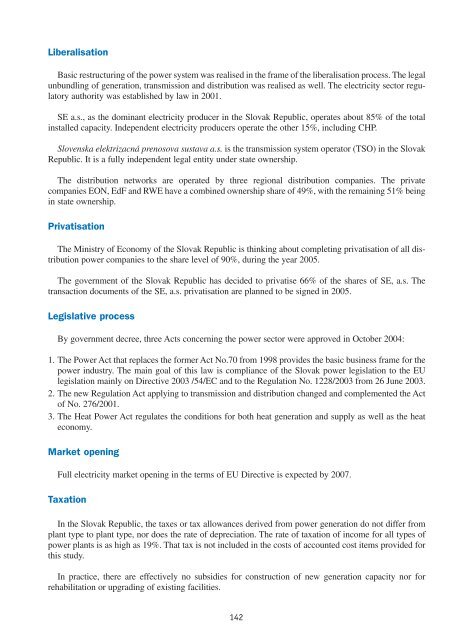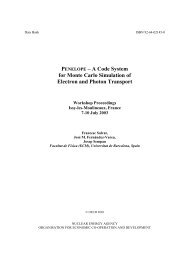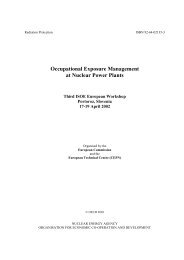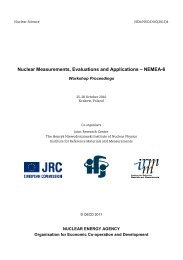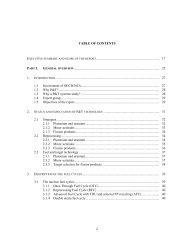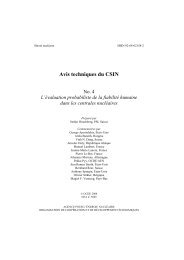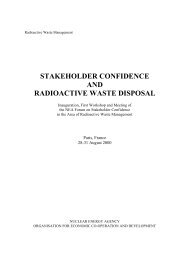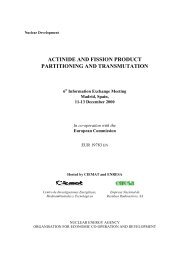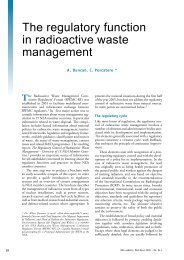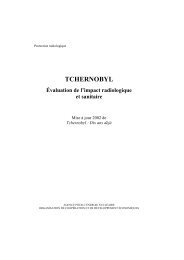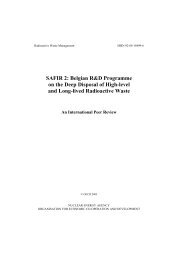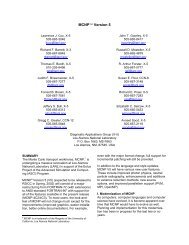Projected Costs of Generating Electricity - OECD Nuclear Energy ...
Projected Costs of Generating Electricity - OECD Nuclear Energy ...
Projected Costs of Generating Electricity - OECD Nuclear Energy ...
Create successful ePaper yourself
Turn your PDF publications into a flip-book with our unique Google optimized e-Paper software.
Liberalisation<br />
Basic restructuring <strong>of</strong> the power system was realised in the frame <strong>of</strong> the liberalisation process. The legal<br />
unbundling <strong>of</strong> generation, transmission and distribution was realised as well. The electricity sector regulatory<br />
authority was established by law in 2001.<br />
SE a.s., as the dominant electricity producer in the Slovak Republic, operates about 85% <strong>of</strong> the total<br />
installed capacity. Independent electricity producers operate the other 15%, including CHP.<br />
Slovenska elektrizacná prenosova sustava a.s. is the transmission system operator (TSO) in the Slovak<br />
Republic. It is a fully independent legal entity under state ownership.<br />
The distribution networks are operated by three regional distribution companies. The private<br />
companies EON, EdF and RWE have a combined ownership share <strong>of</strong> 49%, with the remaining 51% being<br />
in state ownership.<br />
Privatisation<br />
The Ministry <strong>of</strong> Economy <strong>of</strong> the Slovak Republic is thinking about completing privatisation <strong>of</strong> all distribution<br />
power companies to the share level <strong>of</strong> 90%, during the year 2005.<br />
The government <strong>of</strong> the Slovak Republic has decided to privatise 66% <strong>of</strong> the shares <strong>of</strong> SE, a.s. The<br />
transaction documents <strong>of</strong> the SE, a.s. privatisation are planned to be signed in 2005.<br />
Legislative process<br />
By government decree, three Acts concerning the power sector were approved in October 2004:<br />
1. The Power Act that replaces the former Act No.70 from 1998 provides the basic business frame for the<br />
power industry. The main goal <strong>of</strong> this law is compliance <strong>of</strong> the Slovak power legislation to the EU<br />
legislation mainly on Directive 2003 /54/EC and to the Regulation No. 1228/2003 from 26 June 2003.<br />
2. The new Regulation Act applying to transmission and distribution changed and complemented the Act<br />
<strong>of</strong> No. 276/2001.<br />
3. The Heat Power Act regulates the conditions for both heat generation and supply as well as the heat<br />
economy.<br />
Market opening<br />
Full electricity market opening in the terms <strong>of</strong> EU Directive is expected by 2007.<br />
Taxation<br />
In the Slovak Republic, the taxes or tax allowances derived from power generation do not differ from<br />
plant type to plant type, nor does the rate <strong>of</strong> depreciation. The rate <strong>of</strong> taxation <strong>of</strong> income for all types <strong>of</strong><br />
power plants is as high as 19%. That tax is not included in the costs <strong>of</strong> accounted cost items provided for<br />
this study.<br />
In practice, there are effectively no subsidies for construction <strong>of</strong> new generation capacity nor for<br />
rehabilitation or upgrading <strong>of</strong> existing facilities.<br />
142


